SINGAPORE: Netizens say they are not against foreign talent, but urge the government to assure Singaporeans that their jobs, wages, and opportunities will be protected.
This response came after Senior Minister Lee Hsien Loong’s speech on Sunday (9 Mar), where he spoke on the importance of immigration in Singapore’s continued growth.
Speaking at the Teck Ghee Citizenship Ceremony held at Nanyang Polytechnic, Lee said new citizens enrich Singapore and strengthen its economy “in ways beyond what numbers can show.”
Addressing newly naturalised citizens, he emphasised immigration’s vital role in sustaining the country’s demographic and economic progress.
He welcomed them into the Singaporean family and highlighted their role in securing the nation’s future.
Lee noted that Singapore has long relied on immigration to offset its ageing population and low birth rates.
“Every year, we grant citizenship to about 22,000 individuals,” he said, adding that the resident workforce is ageing and already at full employment.
Despite a slight bump in births during the recent dragon year, the number of citizen babies remains around 30,000 annually — still below replacement level.
During his 20-year tenure as Prime Minister from 2004 to 2024, Lee saw more than 400,000 individuals granted citizenship, and over 800,000 became permanent residents. During this period, Singapore’s population grew from 4.17 million to over 6.03 million.
In his speech, Lee cited global cities such as London, New York, and Shanghai as examples of how immigration drives growth and innovation.
Recalling a visit to Google’s headquarters in Silicon Valley, Lee remarked that most researchers there were of immigrant backgrounds.
“That is America’s enormous advantage — it draws top talent from every continent, and therefore it can innovate and stay ahead,” he said.
At the same time, Lee acknowledged that immigration remains a sensitive topic globally, referencing the social tensions and political backlash seen in parts of Europe due to poorly managed inflows.
In contrast, he said, Singapore adopts a careful and calibrated approach, aiming to balance economic needs with social cohesion.
He encouraged new citizens to embrace Singapore’s cultural norms, participate actively in society, and contribute meaningfully.
Likewise, he called on Singaporeans to welcome newcomers and firmly reject xenophobia.
“To firmly reject those who play up nativist and xenophobic sentiments for political gain, which will do great harm to our society,” he added.
In closing, Lee stressed that Singapore’s success depends on contributions from both native-born and naturalised citizens.
As long as the country stays open and united, he said, it will remain vibrant, dynamic, and prosperous.
Netizens call for government to prioritise citizens’ job security
Under CNA and Mothership’s Facebook posts, over 1,500 comments poured in.
Many netizens expressed that while they are not against foreign talent, they believe the government must do more to reassure Singaporeans that their jobs, wages, and standard of living are protected.
One user said foreigners are welcome to work and live in Singapore, but it is the government’s duty to ensure that Singaporeans have secure employment.

Another explained that it is acceptable to bring in foreign talent when they possess unique skills or fill roles that Singaporeans cannot.
However, they criticised the hiring of foreigners with similar skill sets to locals, especially if they are willing to accept lower pay and longer hours.
This, they said, suppresses wages, worsens underemployment, and deepens income and wealth inequality.
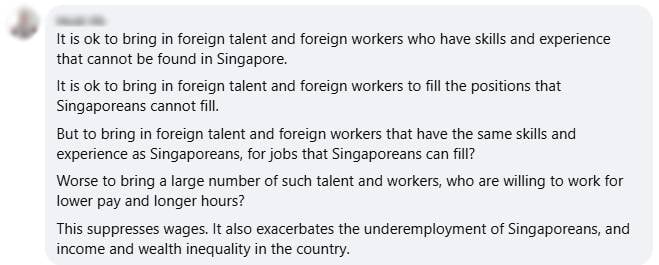
One comment noted that Lee “seems not to understand the ground sentiments.”
While Singaporeans recognise the economic need for foreign workers, the user said the government has ignored day-to-day concerns arising from competition and integration.
They added that the influx affects locals’ chances of securing higher-level jobs, particularly in foreign firms.
“Living standards have also been affected, with many locals now struggling with the ridiculous rising costs.”
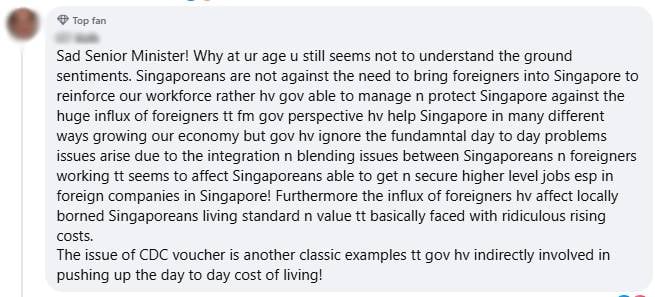
Another user said they are not opposed to new citizens, as Singapore must compete globally for talent.
However, they cautioned that political discontent will grow if citizens feel neglected by local policies.
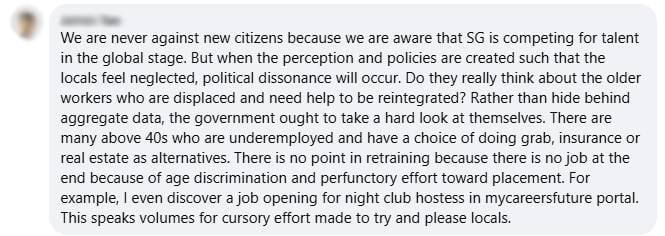
A separate comment compared the situation to family dynamics: “Tensions shouldn’t be felt if the government is doing the right and fair things.”
The commenter said that just as a family would feel resentment if parents favour a newborn over the older children, citizens feel sidelined when the government seems to prioritise newcomers.

One user questioned the balance and the future for younger generations, saying Singaporeans are being squeezed from all sides.
Housing is getting smaller while prices are rising, yet middle-income families are told to accept it.
“Where’s the balance? Where’s the guarantee that our younger generation will even have a fighting chance?” the user asked.
They pointed out that while people are constantly told to upskill and work harder, real-life obstacles keep piling up.
“Policies are made on paper, but people live in reality,” they warned.
“If this goes on, there may be no future left for ordinary Singaporeans.”
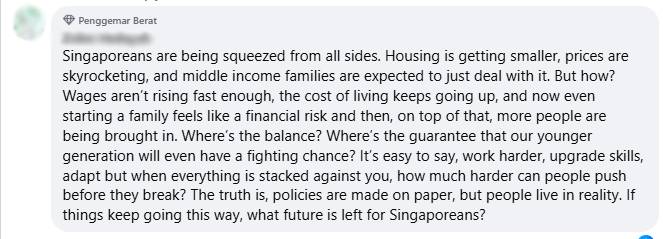
Netizens criticise government for labelling public concerns as xenophobic
Several users expressed frustration that genuine concerns are often mischaracterised as xenophobia.
One user wrote that Singaporeans are pragmatic and foreigners are welcome — but when locals begin losing well-paying jobs while policies appear to favour foreign workers, it is natural to speak up.
“Unfortunately, these concerns are often deemed as being xenophobic,” the commenter said.

Another echoed this, stating that when citizens raise issues about integration and job competition, the government chooses to dismiss the concerns and instead “label its citizens as xenophobic rather than addressing the concerns directly.”

One user commented, “Where there is smoke there is fire. Where there is shit, there are shit stirrers.”
They criticised the government and its supporters for ignoring the underlying issues behind the criticisms.
Rather than addressing them, authorities downplay dissent by branding it as “nativist, xenophobic, populist.”
They asked, “When will the incumbent listen to ordinary Singaporeans?!”
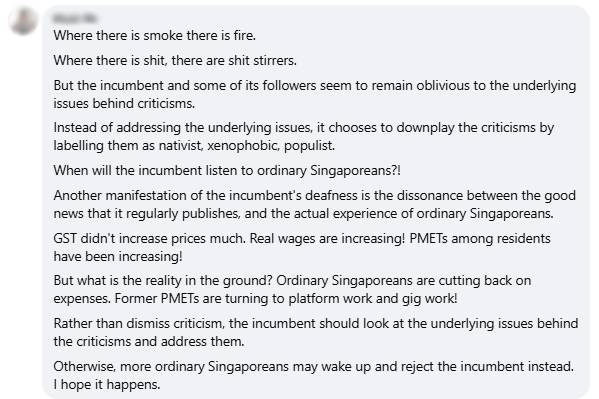
Another commenter warned that labelling citizens as xenophobic is “very arrogant and demeaning.”
They acknowledged the need for foreign talent but argued that ignoring repeated concerns is not acceptable.
“You are elected by citizens, not foreign talents,” the user said, urging the government to engage more sincerely.
“At the very bare minimum, sit down and try to understand why people feel the way they do. Address their concerns.”
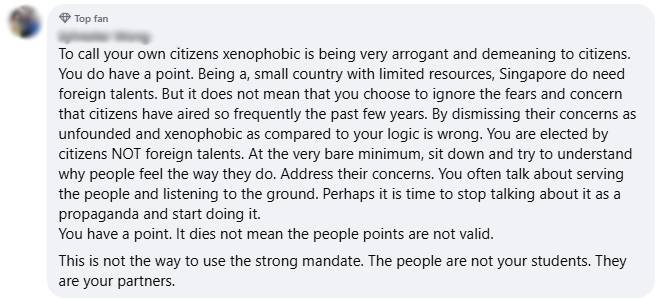
The post Netizens slam Lee Hsien Loong for dismissing job security concerns as xenophobia appeared first on The Online Citizen.


